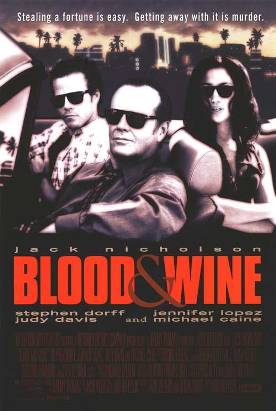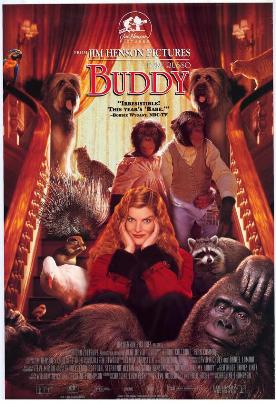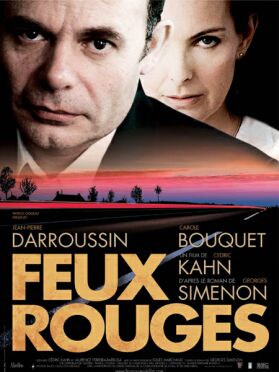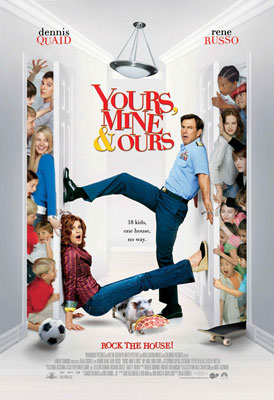Blood and Wine
Blood and Wine is another of those collaborations between Bob Rafelson (director) and Jack Nicholson (star) which promises to be on the cutting edge of hip—just as Five Easy Pieces, The King of Marvin Gardens and The Postman Always Rings Twice were in their day. Another way of putting it might be that the film is, as Pauline Kael said of Chinatown (a Nicholson-Polanski collaboration), “a celebration of rot.” For that is what, I take it, hip means: a vaguely noirish cynicism that actually likes the corruption that is its milieu. But this is a dangerous attitude—destructive, if it is allowed to get out of hand, of dramatic tension and other things that make movies watchable.
In the old noir thrillers, that is, the corruption was not general. One always had the sense not only that there was a basic decency in the world outside that of the gangsters and hustlers with whom we were being invited to slum it, but that even the more sympathetic characters in the noir milieu had, like Philip Marlow, a code of honor that meant something to them. It is these qualifiers of the corruption that seem to have gone out of movies in the last twenty years or so. As I wrote of Robert Altman’s Kansas City last year, too much hip without any innocence quickly degenerates into a mere succession of attitudes or poses, and that is what more and more movies are becoming these days. It is the MTV temptation: why bother to tell a story or carefully build up a character—the hard work of artistic creation in dramatic form—when all people seem to want is those hip attitudes that can be reduced to a series of images on a five minute music video.
This is not exactly the problem with Blood and Wine. On the contrary, I found myself full of admiration for the plotting, the basic story-telling involved. The characters promise to be interesting, though in the end they suffer from the general flattening that one finds in hip movies. Or maybe it’s just Jack Nicholson movies. In everything he’s done since Chinatown (that I can think of) he has worked so hard at being hip and opaque that he has brought down everybody around him, sucked them into that noir hole of hipness that he seems to think is what artistry means. This is no exception. Nicholson’s Alex, a wine merchant in Miami whose taste for the good life has him constantly on the edge of bankruptcy, decides to go into business as a jewel thief but reckons without the fatal complications in his personal life, which get in the way of his dream of affluence.
Here there are potentially strong characters, especially Alex’s accomplice, the aging, tubercular safe-cracker, Victor, played by Michael Caine, and his deeply unhappy, alcoholic wife, Suzanne, played by Judy Davis, but even two such splendid actors as these cannot entirely resist being drawn into the Nicholson orbit, and the young characters, Stephen Dorff as Jason, Suzanne’s son from a previous marriage and Jennifer Lopez as Gabriela, the beautiful Cuban nanny who is Nicholson’s mistress but has a strong attraction to Jason, can scarcely be said to exist apart from their relationship with the attitude-laden Alex. His attitudes produce theirs. Gabriela loves his promises of security and hates his using her while Jason simply hates him. Not that we don’t know how he feels.
But the worst problem the movie has is the writing. This is often true of films carrying an overload of hip: the writers, who have no ultimate creative control, are simply asked to write hip, without any context. When you get the hip lines plugged into the script without any sense of a context which would make them seem natural, they just sound ridiculous. The film’s sprinkling of leaden quips and double entendres (which especially rely on a background of innocence to come across as funny rather than merely grotesque and tasteless) finally destroy all sense of verisimilitude. We are clearly in the postmodern, neo-noir world now and have left reality far behind. When, for example, Victor asks Alex if Gabriela, their inside worker in the rich guy’s house, can be trusted. Alex says she can, and Victor’s reply is: “Don’t take it personally, Alex, but I don’t trust the jury system, the phone company or the Israeli government.”
What, you may ask, is the Israeli government doing here? Well, nothing. It is a writerly addition and not something a man like this would ever have said. A few minutes later they are arguing about whether it was Reagan or Bush who used the expression “a thousand points of light” which, with a typical witticism, Alex has applied to the sparklers they have just pilfered from the rich guy’s cheap home safe. When someone dies, Victor says he approves of “civilized” cremation over burial, “ashes straight to ashes and no worms.” Then he adds, “I worry enough about worms as it is.” Except he doesn’t. These are just examples of a writer trying to write funny. In the right mouth, in the right context they might have been funny too, but here they are not.
Their implausibility infects the rest of the movie. Even Victor’s terror of dying in a charity ward or a prison hospital, which might otherwise have rung true, here is way overplayed and so looks like just another bit of overwriting. The ending involves Jason giving the jewels to Gabriela while preventing Alex from going with her. Sure enough, she is quick to desert him. But then she comes back after Jason and Alex have had a brutal fight. Alex’s legs are broken and he can’t move, but Gabriela presses the necklace into his hand, the thing he has been desperately trying to get hold of throughout the movie. The sirens of police and ambulance are heard. Gabriela says to him: “I thought I wanted it, but I don’t.”
“You’re not that stupid,” says Alex.
“Yes I am,” says Gabriela.
But in fact, no she’s not. That much we can tell from the genre, which does not promise us sudden conversions at the end. Yet somehow, the ending still seems too pat, too easy—not only because everybody but the bad guys gets a consolation prize but because everything else in the movie suggests the writers’ and directors’ thinking, rather than that of the characters.
Discover more from James Bowman
Subscribe to get the latest posts to your email.







